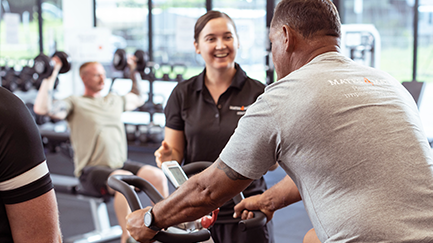
Movement at every stage
When veterans transition out of the Defence Force, they can encounter many challenges, one being how their approach to fitness can change, and then keep changing as they get older.

Brain injuries, including traumatic brain injuries (TBIs) and mild TBIs (mTBIs), such as concussions, are an important health concern within the military community.
Research shows that over 28% of Australian Defence Force (ADF) personnel have experienced an mTBI during their service, with blast exposure and training accidents among the most common causes.
While brain injuries can sometimes be underreported due to stigma often linked to concerns about career impact or perceptions of weakness, awareness is growing. More personnel are now seeking the support they need to recover and thrive, supported by cultural shifts and initiatives aimed at reducing stigma and promoting help-seeking behaviour.
Common causes of brain injuries
Personnel in the Defence Force may face a range of environments and activities that increase the risk of brain injury, including:
Understanding these risk factors helps us better prevent, identify, and respond to brain injuries.
Understanding the impact
Brain injuries can affect various aspects of life: physical health, cognition, emotions, and independence. While severe injuries require comprehensive care, many individuals with mTBIs also experience symptoms that can impact daily life, such as:
The good news is that with the right support, many people experience significant recovery. Early intervention, personalised rehabilitation, and ongoing care can help manage symptoms and improve quality of life.
Navigating diagnosis and treatment
Because brain injuries are often ‘invisible’ and symptoms may develop over time, diagnosis can sometimes be challenging. However, growing awareness and advances in assessment, including neuropsychological testing and brain imaging, are improving early detection and allowing for more tailored intervention.
It’s important to seek help promptly as addressing symptoms early can promote better outcomes and empower recovery.
Support at Mates4Mates
At Mates4Mates, our staff are dedicated to supporting veterans and their families through every stage of recovery. Our multidisciplinary team of health professionals will work collaboratively to support your physical and mental wellbeing.
Whatever your journey looks like, Mates4Mates is here to help you regain confidence, improve wellbeing, and enjoy a fulfilling life after injury.
To find out more, reach out to us on 1300 4 MATES (62 837) for a confidential chat.
Written by Katerina Petropoulou, Mates4Mates Physiotherapist.

When veterans transition out of the Defence Force, they can encounter many challenges, one being how their approach to fitness can change, and then keep changing as they get older.